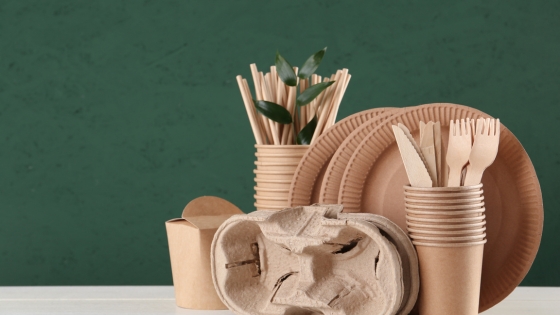
In today's world, the importance of living sustainably cannot be overstated. From reducing plastic waste to minimising carbon footprints, there are countless ways individuals can contribute to a healthier planet. One often overlooked aspect of eco-conscious living is the utensils we use in our daily lives.
From cooking and serving meals to enjoying our favourite dishes, the utensils we choose can have a significant impact on the environment. In this blog post, we'll explore a variety of eco-friendly utensils that every household should consider incorporating into their kitchen arsenal.
Bamboo Utensils

Bamboo has emerged as a popular choice for eco-friendly utensils due to its sustainable properties. Unlike traditional hardwoods, bamboo is a fast-growing renewable resource that can be harvested without causing long-term environmental damage.
Bamboo utensils similar with these 5 Pcs Reusable Bamboo Cutlery Set with Case, and such as spoons, spatulas, and tongs, offer a lightweight and durable alternative to their plastic counterparts. Additionally, bamboo utensils are naturally antibacterial, making them ideal for use in the kitchen. To ensure the longevity of bamboo utensils, it's important to wash them by hand and avoid soaking them in water for extended periods.
Stainless Steel Utensils
Stainless steel utensils are another excellent choice for eco-conscious consumers. Not only is stainless steel highly durable and long-lasting, but it is also fully recyclable at the end of its life cycle. From cooking pots and pans to serving spoons and forks, stainless steel utensils come in a wide range of options to suit every kitchen need.
Unlike plastic utensils, which can leach harmful chemicals into food, stainless steel is a safe and non-toxic material that won't affect the taste or quality of your meals. Cleaning stainless steel utensils is a breeze, requiring only soap and water to maintain their shine and durability.
Silicone Utensils
Silicone has gained popularity in recent years as a versatile and eco-friendly material for kitchen utensils. Made from silica, a compound found in sand, silicone is non-toxic, heat-resistant, and durable. Silicone utensils, such as spatulas, brushes, and baking mats, offer a flexible and easy-to-clean alternative to traditional plastic utensils.
Unlike plastic, silicone does not degrade or leach harmful chemicals over time, making it a safe choice for food preparation. Silicone utensils are also dishwasher-safe, making them convenient for busy households.
Wooden Utensils
Wooden utensils have been a staple in kitchens for centuries, and for good reason. Not only do wooden utensils offer a natural and rustic aesthetic, but they are also environmentally friendly. When sourced from sustainably managed forests, wooden utensils are a renewable resource that can be harvested without causing deforestation or habitat destruction.
Common wooden utensils include spoons, forks, and salad servers, each offering a unique texture and feel. To maintain the longevity of wooden utensils, it's important to hand wash them and occasionally treat them with food-safe oil to prevent drying and cracking.
Eco-Friendly Disposable Utensils

For occasions when disposable utensils are necessary, there are plenty of eco-friendly options to choose from. Biodegradable and compostable utensils made from materials such as cornstarch, wheat straw, and palm leaf offer a sustainable alternative to traditional plastic cutlery.
These utensils are designed to break down naturally over time, reducing the environmental impact of single-use plastics. Whether hosting a picnic, party, or outdoor event, eco-friendly disposable utensils provide a guilt-free solution for convenient dining on the go.
Incorporating eco-friendly utensils into your household is a simple yet impactful way to reduce your environmental footprint and promote sustainable living. Whether opting for bamboo, stainless steel, silicone, wooden, or eco-friendly disposable utensils, each choice you make contributes to a healthier planet for future generations.
By prioritising sustainability in your kitchenware choices, you can take meaningful steps towards creating a greener and more sustainable world. Let's embrace eco-friendly utensils and make a positive difference, one meal at a time.
FAQs:
Are eco-friendly utensils more expensive than traditional plastic utensils?
Eco-friendly utensils can sometimes be more expensive upfront due to the higher cost of sustainable materials such as bamboo, stainless steel, or silicone. However, they often offer greater durability and longevity, making them a cost-effective choice in the long run.
Can eco-friendly utensils be used in the dishwasher?
It depends on the specific material of the utensils. Stainless steel, silicone, and some bamboo utensils are typically dishwasher-safe. However, wooden utensils may be damaged by the heat and moisture of a dishwasher, so it's best to hand wash them to prolong their lifespan.
How can I dispose of eco-friendly disposable utensils properly?
Eco-friendly disposable utensils made from biodegradable materials like cornstarch or palm leaf can be disposed of in compost bins or facilities where available. If composting is not an option, they should be disposed of in regular waste bins. Avoid throwing them in recycling bins unless they are specifically labelled as recyclable in your area, as compostable materials can contaminate the recycling stream.
Enjoyed reading our article on eco-friendly utensils? Why not show your support by giving it a like and sharing it with friends and family? We'd love to hear your thoughts and experiences with eco-friendly living, so don't hesitate to leave a comment below.
While you're here, explore our other blog posts on sustainable living, and read "Your Guide to Eco-Friendly Periods: Caring for Reusable Sanitary Pads". Thank you for being part of our community committed to making a positive impact on the planet!
#Ecofriendlyutensils #Sustainablekitchenware #Greenliving #Ecoconsciouslifestyle #Sustainablehome #Ecofriendly #Kitchensustainability
